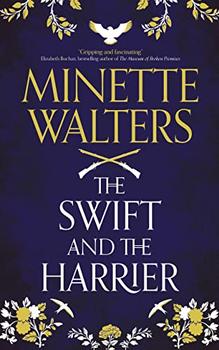Summary | Excerpt | Reading Guide | Reviews | Beyond the book | Read-Alikes | Genres & Themes | Author Bio

Whether or not Mr Thomas knows that it takes a village to raise a child, he knows for certain that it takes a village to successfully animate an historical mystery. That "village" is the city of York, England in the 17th Century; home to an uppity woman by the name of Lady Bridget Hodgson. And animate it - and her - he does in his new novel The Midwife's Tale!
"The river always had a stink about it, but the moat [around the gaol where Esther is imprisoned] was truly noxious, for the soldiers used it to dispose of their waste. I made the mistake of looking down and saw the corpse of a large dog, half-submerged in the water."
In the opening pages of chapter one, Bridget, a midwife, encounters throngs of frightened townspeople "racing home, carrying whatever food they had found for sale in the shops or markets." Right away we begin to get the feel of a town under siege, a town where life - birth to death - must go on, despite the gathering forces jockeying for pre-eminence in what will become a bloody civil war. And as we view this city through Bridget's eyes we see, hear, smell and feel how she is involved in one measure or another in both life - at its earliest stages - and death. This time it's a death that takes most of her attention. Death at the hands of unknown but clearly calculating individuals who let nothing stop them from attaining their own ends.
We see and feel the abject poverty of a young woman about to give birth in a dark, sparsely furnished room she shares with her sister. She is lying half-naked "on the straw mattress" with only a "canvas sheet and a single rough wool coverlet" as meager comfort. With little light and even less food in her hovel we learn that Mercy's living conditions exemplify those of most of her class, what we would call today the working poor. Bridget tends to their natal needs much as she serves those of the higher classes. Except that this woman's child is a bastard and as such Bridget has to force her to reveal the father's name. English law demanded this so the child did not become a "burden" to the state. How neatly Thomas reveals British law, as his protagonist enforces those that apply to her profession.
As a midwife, Bridget wields a good bit of authority in her community. In this case - trying to solve the mystery of who killed Stephen Cooper - to forestall the execution of her friend Esther Cooper, already convicted of murdering her husband in what Bridget sees as an unjust trial. Indeed, given the status of her profession and her class Bridget considers herself "equal to most men and [even] superior to some." Thus she would not shrink from dressing down the city's ugliest ruffians or even defying the wishes of The Lord Mayor. When a soldier challenges her presence in a sleazy tavern that "reeked of sweat, spoiled ale, and rotting food" she boldly prevaricates that she has come by the "command of The Lord Mayor." Bridget lets no man or woman stand in her way even while accepting the fact that murdering one's abusive husband is considered an act of treason. Apparently even in the 17th Century - maybe especially in the 17th Century - a thinking woman had to tolerate a good bit of cognitive dissonance.
And so the sights, the sounds, the aura of midwifery and the city of York in the midst of rebellion resonate as if part of a chorus that thrums behind the tune of Thomas's charming mystery. The only flaw in this otherwise consonant novel is that we know so little of the characters' backstories. I am hoping there will be more from Thomas and the machinations of the team of Lady Bridget Hodgson and her servant, Martha Hawkins.
![]() This review was originally published in The BookBrowse Review in March 2013, and has been updated for the
January 2014 edition.
Click here to go to this issue.
This review was originally published in The BookBrowse Review in March 2013, and has been updated for the
January 2014 edition.
Click here to go to this issue.

If you liked The Midwife's Tale, try these:

by Minette Walters
Published 2023
A sweeping historical adventure set during one of the most turbulent periods of British history--featuring a heroine you'll never forget...

by Stuart Turton
Published 2021
A murder on the high seas. A remarkable detective duo. A demon who may or may not exist.
Judge a man by his questions rather than by his answers.
Click Here to find out who said this, as well as discovering other famous literary quotes!
Your guide toexceptional books
BookBrowse seeks out and recommends the best in contemporary fiction and nonfiction—books that not only engage and entertain but also deepen our understanding of ourselves and the world around us.